Text
You’re beautiful, Fuji
If you were at the festival, you probably heard it a dozen times from the stage. But we’ll say it again: You’re a beautiful audience and we love you. The dancers, the singers, the shouters, the moshers, the ravers, the groovers. You’re the greatest.

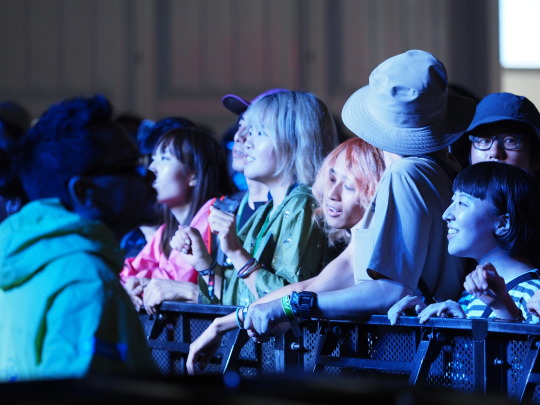
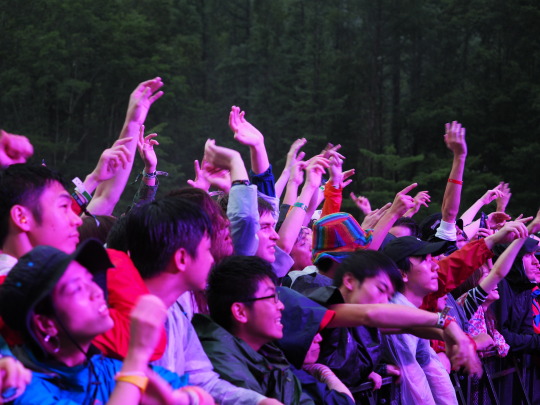
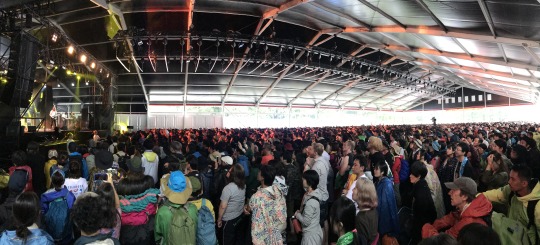
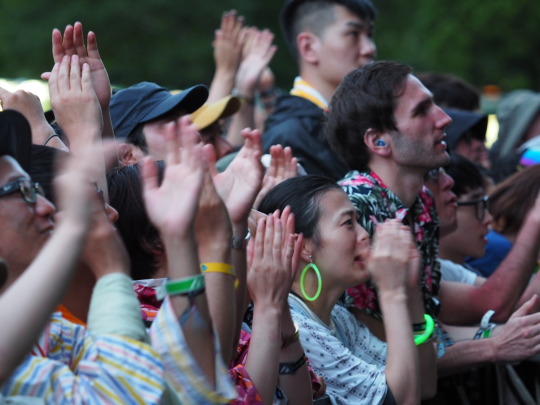
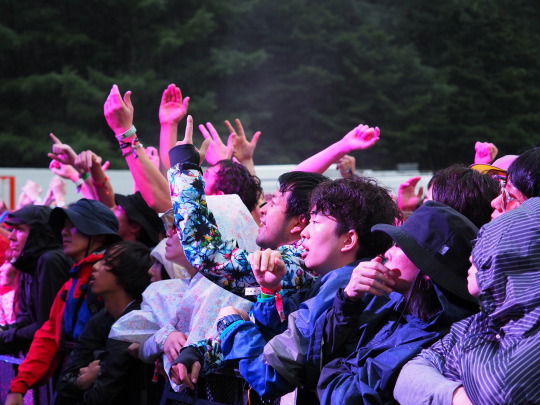
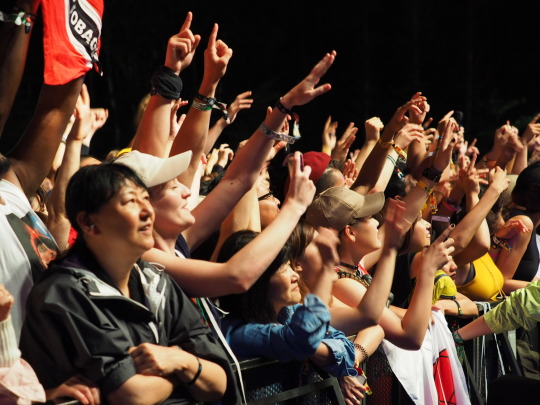
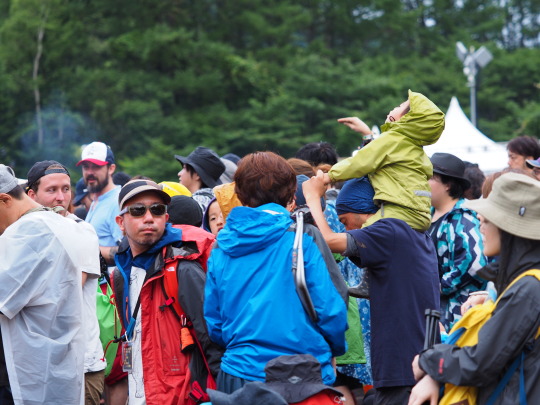
1 note
·
View note
Text
Just a party, y’all
We’re a bit cynical when it comes to performing DJs. We tend to think that there’s not much to actually “performing,” since the DJ could conceivably just make a long file and then pretend to be mixing and switching as gestures to the audience. Major Lazer, the collective dance music project headed by internationally famous producer Diplo, doesn’t bother with the conceit when they play live. Though there is a guy behind the boards (Diplo? Not really clear), the music is accompanied by all sorts of performative nonsense—streamers, giant plastic globes, pyrotechnics, dancing girls—that pretty much set the stage for what their concerts are—just a huge party. And the audience was only too willing to participate.
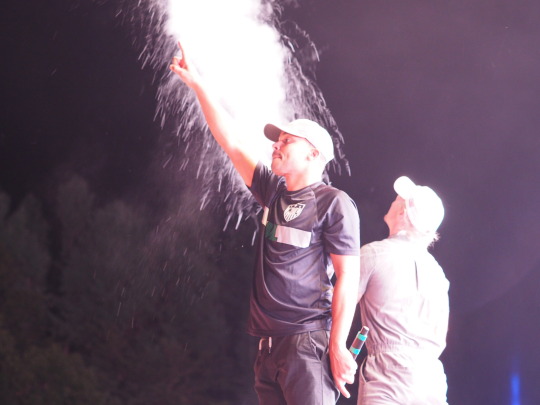
And it was a kind of crude, regressive party, which may be the best kind and copacetic to the hip-hop value set. The dancing girls, for instance, were obviously at the beck and call of the male hosts, who made no bones (no pun intended) about using them for their own pleasure. At one point they called on everyone to take off their shirts, and when very few people obliged they had to moderate the request by asking people to just grab something to throw in the air. As parties go, it was a makeshift affair.
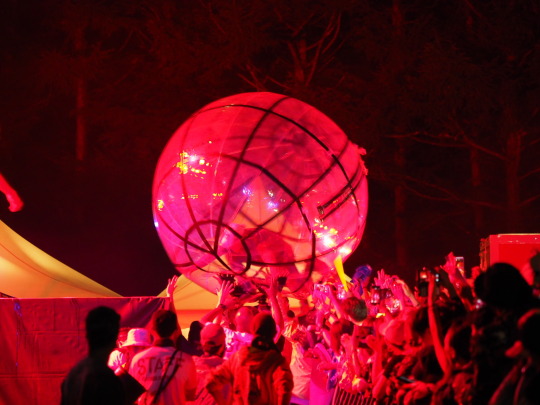
But an effective one. When they said “jump,” everybody jumped. When they said “crouch down on the ground,” everybody crouched. It was nasty in the best sense, and once Bjork’s show was over, that party joined this one. People are very adjustable.
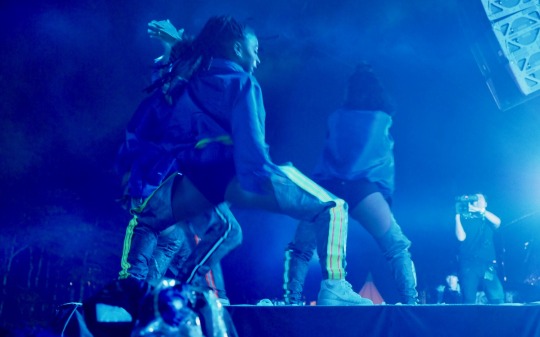
0 notes
Text
Thunder on the mountain
It was a difficult decision as to whether to take in Bjork’s headlining show or that of Stephen “Thundercat” Bruner, probably the busiest bass player in hip-hop. His topped the Field of Heaven roster on Sunday, and while a lot of the bands who played there this weekend weren’t much into the jam band aesthetic that was the original concept for the stage, Thundercat’s canny blend of yacht rock, fusion and hip-hop actually did. Accompanied by a drummer and a keyboard player who had to really cook to keep up with Thundercat’s hyperactive playing and singing, Bruner was expansive in the most literal sense, opening up his poppy R&B into full-blown bebop, with him and his partners challenging one another to supersonic solo flashes.
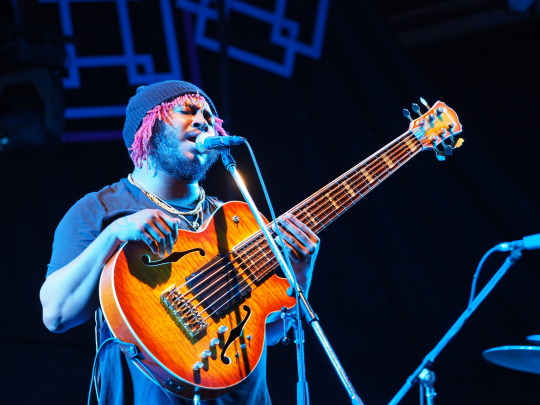
And he was clearly enjoying himself. Though his vocals, purposely mimicking the original yacht rock vocalist, Michael McDonald, were the main affair, it was his bass playing that stole the show. He’d get on a rip and take it farther than it could possibly go, faster, more complicated, and more beat-savvy. The audience just stood there slack-jawed, barely comprehending a hip-hop artist who dared attempt serious jazz, and yet it worked on both accounts. The fact that he was laughing and carrying on through the whole think just proved how confident his was. And confidence saved the day. (Text: Philip Brasor; photos: Mark Thompson)
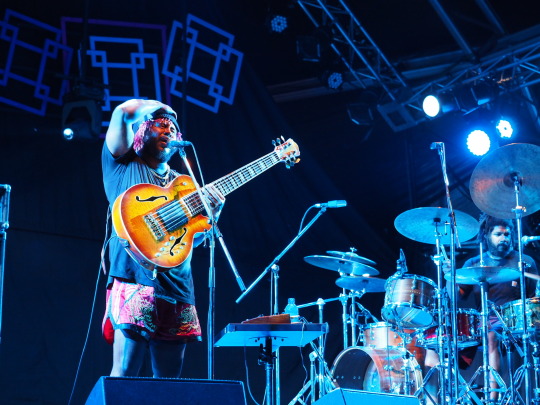
0 notes
Text
In the mood
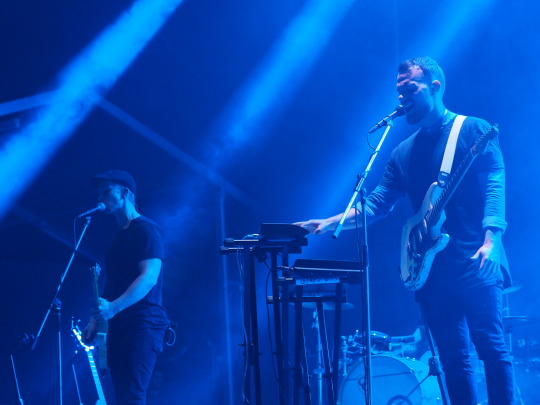
Bjork wasn’t the only Icelandic artist on the bill this year. Asgeir Einarsson held forth on the White Stage in the early evening, and while his brand of pop is just as chilly as Bjork’s, he doesn’t go into beats or extreme feelings. If anything, Asgeir is perfectly honest about his vision of the world, which is stark and natural. His songs trend toward the contemplative, and his mix of guitar theatrics and electronic filigree, and English lyrics that actually mean something, gives him a reputation as an overly sensitive individual. For the most part, his show was subtle to the point of being insubstantial, but the field was packed, so obviously a lot of people get the message. (Text: Philip Brasor; photos: Mark Thompson)
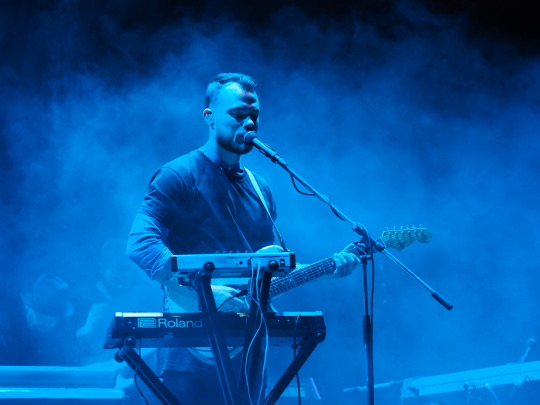
0 notes
Photo
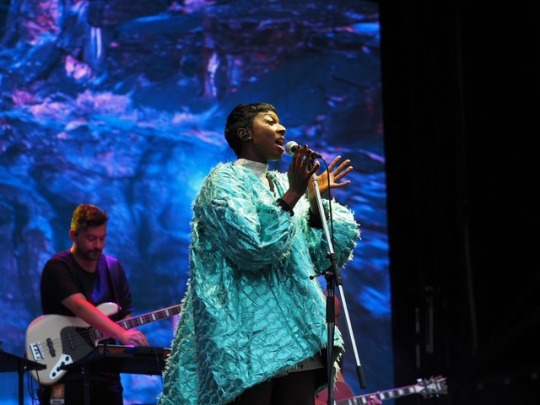
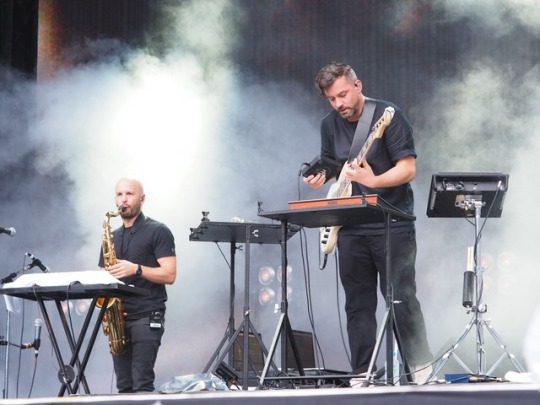
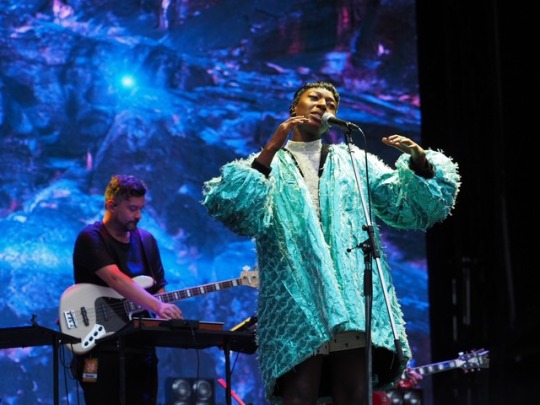
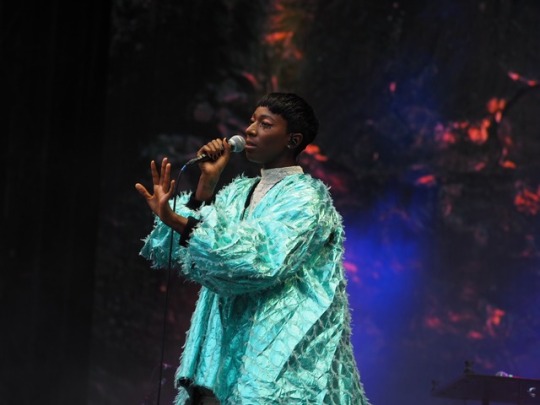
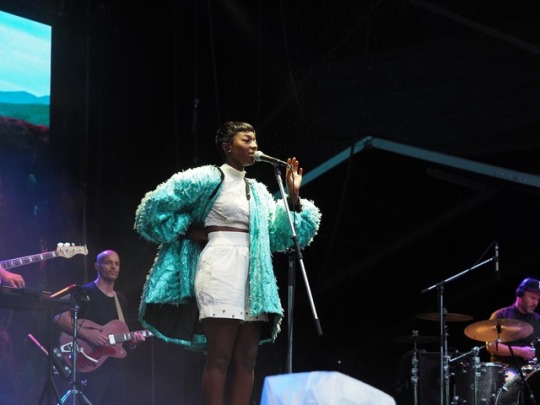
Bonobo (live) at the White Stage
0 notes
Text
Everybody’s Lorde
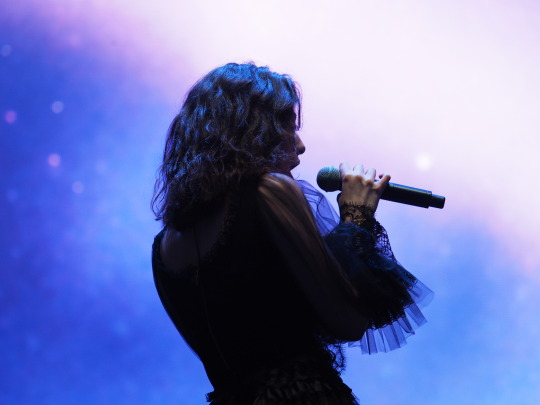
Lorde’s talents speak for themselves, but only her youth explains her performance on the Green Stage under a suitably dramatic parting of dusk clouds. Spinning and cantering in a long see-through lace skirt and white Adidases, the New Zealand singer-songwriter took full advantage of her burgeoning fame as the voice of female millennials. But she was also site-specific. After her first song she explained that she’d played the Red Marquee back in 2014, when she was still a teen, and couldn’t believe she’d been promoted to the main stage, and as the opener for Bjork! (Actually, she didn’t mention Bjork, but the significance is obvious)
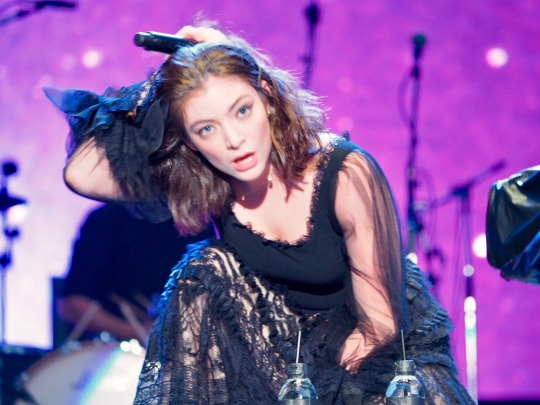
Prefacing each song with a small explanation of its meaning, Lorde seemed oblivious to the fact that a substantial portion of the people she was talking to had no idea what she was saying, and we’re not just talking about the Japanese listeners. We understood it more when she explained she was a witch and that playing in front of a mountain had special meaning. We weren’t entirely sure what she was talking about when she went on about having crushes as an even younger person. We mean, we understood, but didn’t really care. It is a youth thing, and if the young female Japanese members of the audience did care about such things, we’re not sure they absorbed her specific take on it.
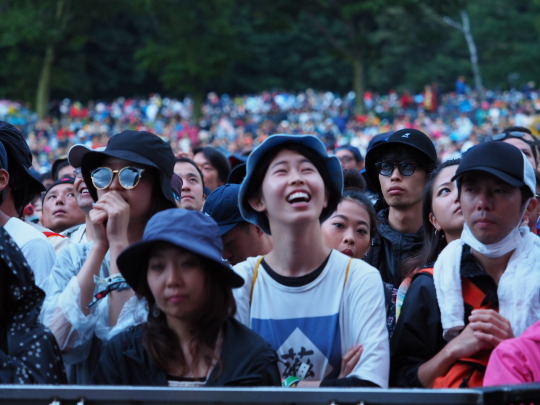
But she kept saying how “honored” she was to be here, and that such a “loving” festival could only happen in Japan. Apparently, she had toured the grounds during the day, incognito in a surgical mask, and was impressed with everything. She gave back with a singularly heartfelt performance that was all about her. Her musicians practically vanished in the glow of her self-regard, and we’re fine with that. Lorde wouldn’t be the artist she is without that self-regard. But we have a feeling that ten years from now she’ll hit herself on the forehead when she remembers this concert and say, “What was I thinking?” (Text: Philip Brasor; photos: Mark Thompson)
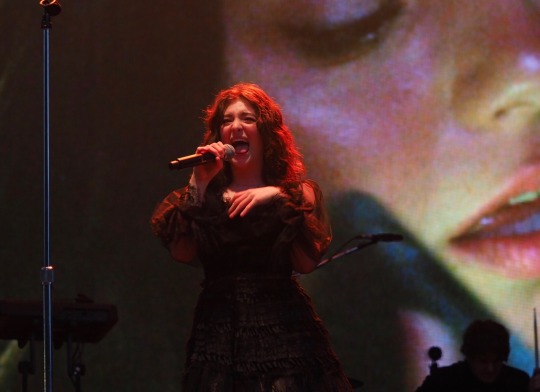
0 notes
Text
Back in the woods
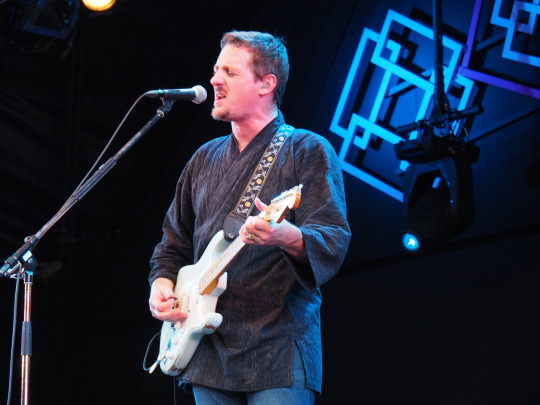
It wasn’t surprising that Sturgill Simpson’s set at the Field of Heaven in the late afternoon was sparsely attended. Country music doesn’t get a lot of attention in Japan except from diehards, and Fuji Rock is, basically, a rock festival. However, Simpson is not purely a country artist, though he’s go the classic drawl and the sad sack subject matter that have made him one of the more interesting left field country artists in America right now. But he’s also a mean guitar player who’s obviously studied Clapton, Page, Van Halen and other blues based shredders, and he shapes his songs around solos and big instrumental moments.
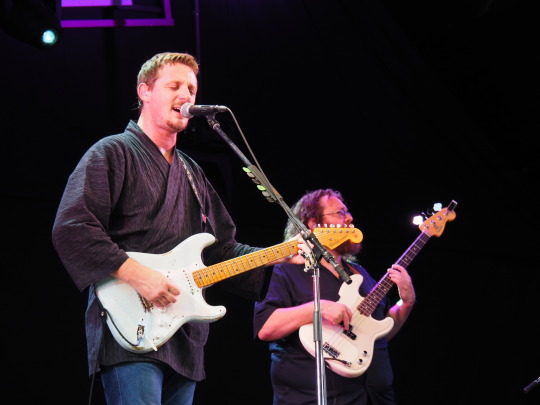
If more people knew about this aspect of Simpson’s music, they probably would have showed up. Moreover, if they knew that Simpson once lived in Japan when he was with the US Navy, they might have been more curious. He word a Hakama jacket in deference to Japan, but he was too shy to make a big deal out of his time here. He dedicated “Sea Stories” to Japan, a song about drinking in the country mode, but here the drinking is in places like Roppongi, Harajuku, Shibuya, etc. The crowd picked up on every reference and cheered each one. Who says country music doesn’t travel.
But what really hooked the crowd was the rock dynamic of what we consider the best-looking group at the festival so far: an organist who looks like John Kaye’s evil twin, a mountain of a bass player, and a drummer who was probably the ne’er-do-well son of a backwoods gas station monopoly. They shifted capably from backwoods country to electric blues to classic rock with the facility of a great bar band, and the audience was sucked in.
Country, yes, but it was also the best pure rock show of the weekend.
(Text: Philip Brasor; photos: Mark Thompson)
0 notes
Text
Slow corps
By now, we’re pretty anxious whenever we step into the Red Marquee. Though the rain has mostly held off today, as soon as we entered the tent to wait around for the British shoegazer outfit Slowdive, it did start to rain in earnest, and we wondered it we were the cause. Actually halfway through the set we noticed some sunshine outside, but maybe that was our imagination, or a mirage. But in any case the rain seemed to have stopped.
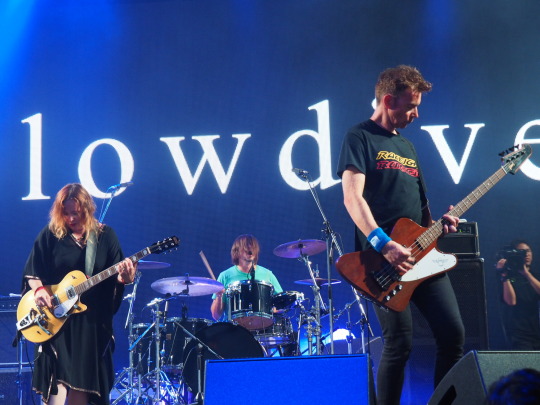
Who knows? Maybe the band’s hypnotic psychedelic guitar sound appeased the weather gods. For sure, their music is not the kind of thing we listen to at home. It’s too redundant, the tempos are all the same, and there’s no dynamic range—songs start incredibly loud and remain that way. The only distinctions are melodic and harmonic.
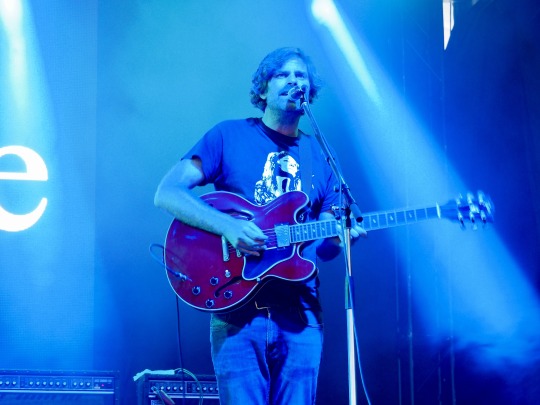
But live, this stuff works much better than you could imagine, and while some of the people definitely stopped by to get in out of the rain, by the end of the set, they were as hypnotized as those who expected to be. I mean, any band with three guitars has to be paid attention to.

At one point, Neil Halstead commented about Japan, “I really like that the weather doesn’t change here,” though maybe he was talking about the weather inside the Red Marquee. God knows it changed three times during their set outside.
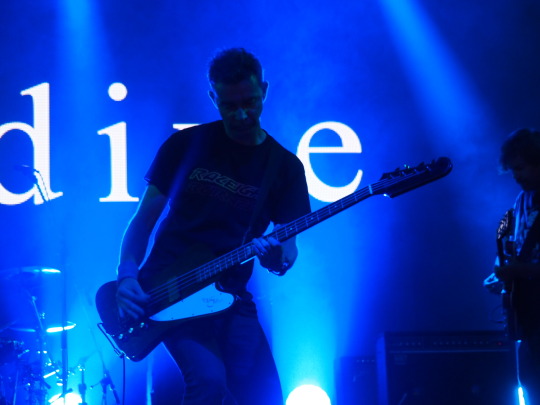
(Text: Philip Brasor; photos: Mark Thompson)
0 notes
Text
Boy wonder
Shugo Tokumaru is pretty much the standard bearer for that quirky brand of Japanese indie rock, and has been for a while. He’s become so good at it that he has no problem tempting ridicule with overly cute touches. There were lots of interesting things on the White Stage before he came out, including mechanical dolls.
The cuteness works not as cuteness but as something with meaning in an entertainment sense. Tokumaru is no longer a boy, but he still understands what impressed him when he was young and he tries to impart that wonder to his audience. During his afternoon set, when there was a lull in the precipitation, he explained that although Mount Fuji is far away, Fuji Rock Festival can still celebrate a great Japanese mountain, except that it’s Mt. Naeba.
This imaginative and optimistic grasp of the world extends to the music, which is happy without being saccharine, quirky without being precious. Time and key signatures are as malleable as Tokumaru’s imagination, and he’s go the band to make it happen. Everyone except the drummer and the bass player double and triple on various instruments. The woman who was mostly on the accordion picked up the electric guitar for one song and stood on platform to shred, the keyboard player fanning her with a big board to make her hair blow like a real rock star.
Tokumaru also brought out Maywa Denki, the two-man performance group whose schtick is inventions for every situation, in this case an electrical percussion instrument that Maywa’s president word like a set of wings. He added beats to a great Latin tune and it made perfect sense. As did the bluegrass interlude in another song (Tokumaru is a great guitarist), and the crude AV touches, like streamers that came out during the climax of another song, a did the whistling and mouth percussion that formed the “solo” in another song.
In Tokumaru’s world, everything works because it works in his head. That he allows us entry is a privilege.
(Text: Philip Brasor)
0 notes
Text
Hangover music
The Sunday openers are usually a very different breed of musician than those who start up Friday or even Saturday. Those people are supposed to jump start the audience, but the Sunday acts tend to be more soothing, since more likely than not anyone who manages to drag themselves out of their tents before noon is feeling the previous night’s excesses. So it was only proper that Canadian singer-songwriter Ron Sexsmith, who seems to play Fuji every two years or so, took the Green Stage with his gentle songs of love and pain. Self-deprecating to the point of ridiculousness (“Here’s one you may know...or maybe not”), he was dressed in a spiffy checked sport coat and a straw fedora, his characteristically boyish features filled out considerably in middle age. He speaking voice is indistinguishable from the one he uses to sing: lilting and a little shy. When he occasionally breaks out in a solo on his acoustic guitar, you surprised he has that much fight in him.
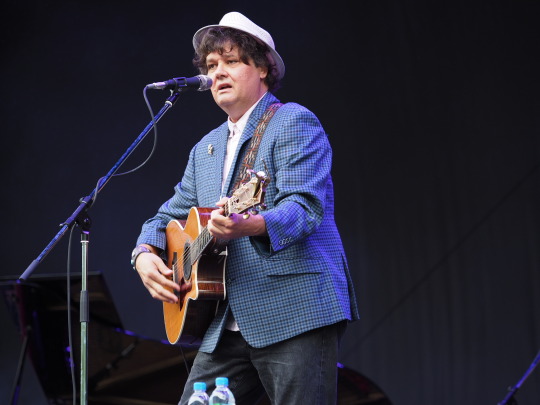
Sexsmith dedicated the set to a woman who worked for Smash but apparently doesn’t any more. We’d hate to think she might have died, but it was difficult to tell in Sexsmith’s dedication, which didn’t seem particularly sad. He has lots of fans in Japan, despite the language barrier, and when we went close to the stage we saw a lot of them swaying to his lovely little melodies and mouthing the works. Most were couples. It’s the kind to music that seems to appeal to people who are happy in love, rather than those who aren’t, and when he left the stage after a strong 50 minutes, he received a heartfelt ovation that belied the tiny crowd. He’ll be back.
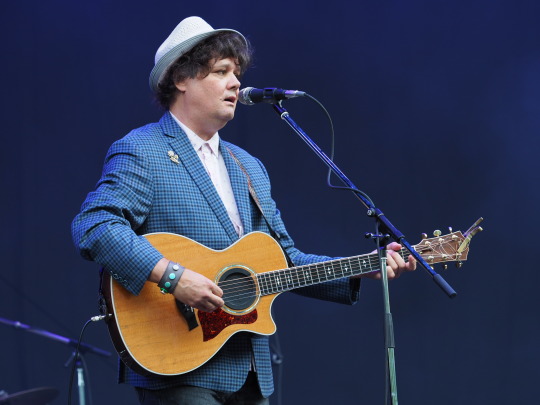
The White Stage had a relatively laid back opener as well. Real Estate, the New Jersey band who plays a satisfyingly redundant, slightly hazy take on guitar pop was the perfect band to ease the crowd into a Sunday that threatened to be as wet as Saturday, but toward the end of the set the drizzle let up and there was even a few patches of blue. Martin Courtney has one of those high, very white voices that wouldn’t hurt a fly even if he were reciting Danzig lyrics, and combined with the group’s infectious sense of melody, the audience, which almost filled the White Stage area, fell right into their mid-tempo rhythms. It was better than aspirin, and easier to take.
0 notes
Text
Excellent student
Though as the crow flies, Siberia isn’t that far from Japan, in terms of making it from there to here as a DJ, Naeba might as well be on the moon. But there was producer Nina Kraviz taking the Red Marquee at 2 in the morning for an emotionally rich, often gorgeous 90 minutes of electronic music. Apparently, Kraviz got into the game in a decidedly unsual way—she actually studied to be a DJ-producer at the Red Bull Academy, after moving from Irkutsk to Moscow, where she formally studied dentistry but mainly fell into the city’s dance music scene. At the Red Marquee she didn’t sing, which she often does on her records, but the music was lyrical anyway—open-hearted even. We wouldn’t call it happy music, like The Avalanches show earlier in the day, but it put us at ease. You danced because it felt good. You couldn’t resist.
vimeo
0 notes
Text
Stuck
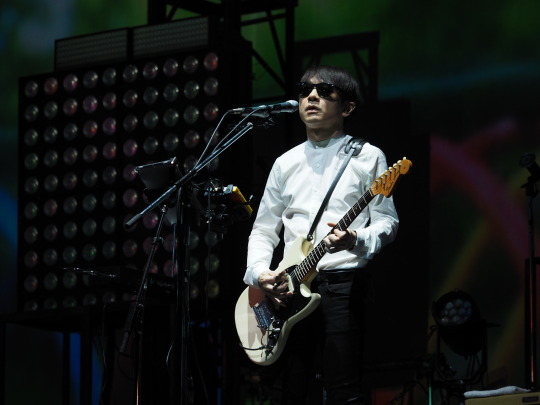
It was bound to happen, though it also could have probably been avoided. There was a huge traffic jam on the trail linking the Green and White Stages in the early evening that stretched on into the night. The main problem was the Cornelius was playing the Green Stage and then his old music partner, Kenji Ozawa, was on the White Stage a little later. Naturally, it seems that everyone who is a Cornelius fan is also an Ozawa fan, but the White Stage area is much smaller and it couldn’t handle the overflow. In fact, the staff disassembled some of the barriers on the north side of the White Stage area in order to accommodate the extra people.
vimeo
0 notes
Text
Man of mystery
Richard D. James has developed an enviable image of a reluctant star in his incarnation as Aphex Twin, and it’s always made sense. Electronica artists don’t need to be faceless, and James isn’t as obsessive about his identity as some people are, but his aim has always been to steer people’s attention to his music rather than to himself. And that music demands extra attention.

Though he’s produced danceable material, he’s also made a lot of stuff that is just plain out there, which is why it’s difficult to explain why he deserves to be a headliner at one of the biggest rock festivals in the world. His set at the Green Stage on Saturday—traditionally the one day of the weekend that is guaranteed to sell out for simply logistical reasons—was an organic, growing thing that didn’t necessarily rely on beats to draw the listener in. It was all shifting textures abetted by complementary visuals (none of him, of course) that would occasionally turn into something stimulating, even exciting, but never remained there long enough to get a dance pulse going.
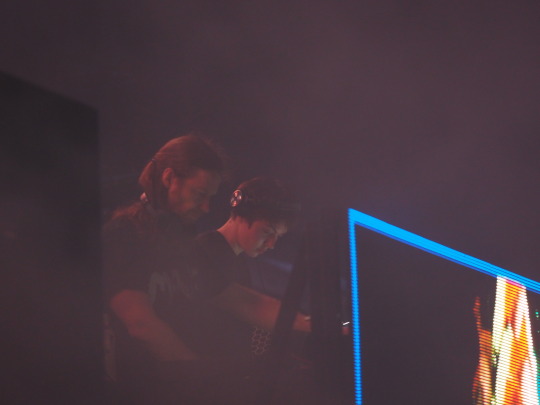
The highlight, in fact, was when red lasers sketched patterns on the side of the mountain facing the stage. As was true all day, the rain came and went, and about 45 minutes into the set there was a brief downpour that obviously affected people’s relation to the music. People had gotten used to the rain, but it was still a distraction.
0 notes
Text
Don’t stop can’t stop
Certainly, one of the most memorable shows we’ve ever seen at Fuji Rock was Death Grips after midnight at the Red Marquee back in the early 2010s. Though we were familiar with their material up to that point, the manic energy of the performance was so disorienting that we couldn’t get a handle on the song, but the visceral impact was powerful. We left it shaken and somehow wanting more.
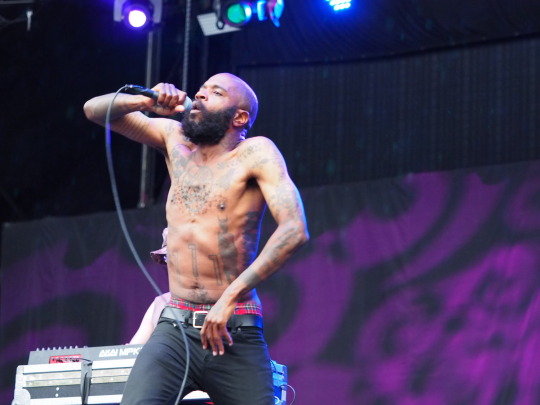
The trio returned this year to the more conventional White Stage during a lull in the rain of the day. Though the group had effectively called it quits in 2014, they somehow kept going, and the White Stage show proved just how far they’d actually progressed since their retirement. MC Ride, the group’s rapper and front man, has always come across as a purely performative figure, an artist whose whole being is invested in the moment, and for one full hour on the White Stage he never seemed to exit his own head. Naked from the waist up, he was the classic hip-hop MC, but with a personal grudge against the universe, inveiling against the social and systemic rules that marginalized him, but since the music itself is so dense and abrupt, it’s almost impossible to understand what he’s saying. But the crowd picked up on the desperation, despite the conventional lack of melody and sturcture. Zach Hill, equally topless, matched DC Ride’s emotional extravagance with drumming that seems almost superhuman in its capacity to keep things going, but it was programmer Andy Morin, who with his bizarre set of evil scientist expression behind the board who kept the set moving forward.
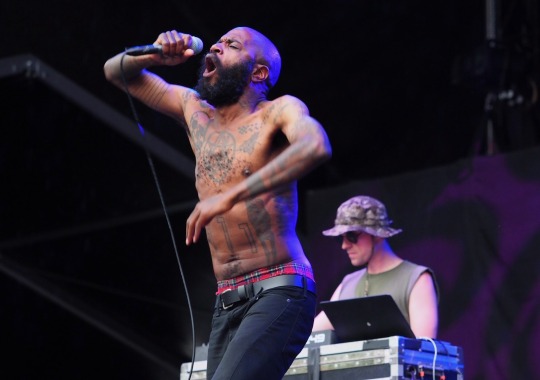
How do they do it? I mean, playing a full hour without a pause, shifting from one “song” to another with impeccable timing and without acknowledging one another. How do they compile their set lists and memorize them. Is there some instinctual connection that makes it all possible? All I know is that, for the full hour I was complicit in their violence, and unlike the previous night’s Arca show, there was not cynicism evident in their transgressive music. It was as honest as the drizzle that occasionally fell, afraid to interrupt. The best show of the festival, so far.
(Text: Philip Brasor; photos: Mark Thompson)
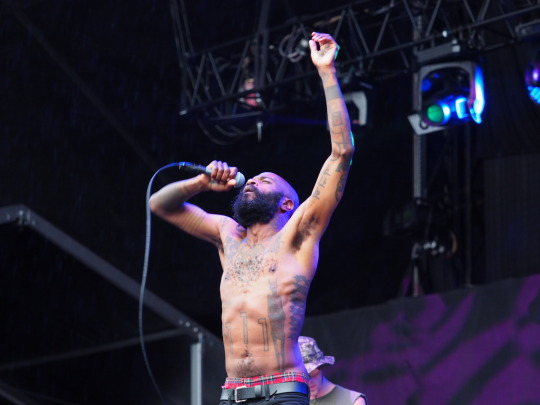
0 notes
Text
Tumbling down
The Avalanches were supposed to appear at last year’s festival but cancelled at the last minute, so their showing up this year was a big deal, and Smash made sure they were situated prominently on the Green Stage in the middle of Saturday afternoon, traditionally the busiest day of the event. Unfortunately, this year it was also the wettest day of the event, and while the Green Stage was well attended, there was a soppy, drenched quality to the proceedings.
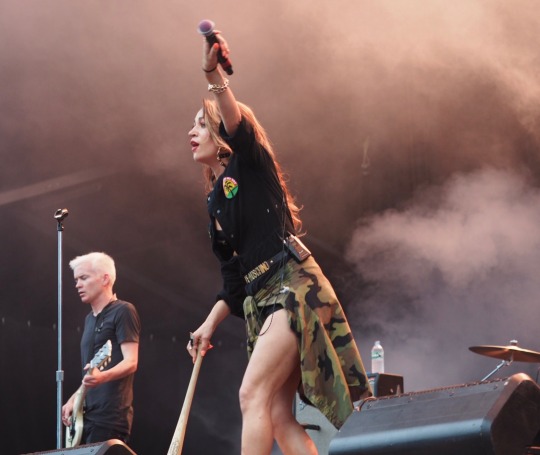
There was also mystery, and thus some surprise. Given that the two album released by the group—16 year apart, no less—are sample driven and derived, no one know exactly what to expect from the “act,” and thus it was interesting to see six people run out on stage. Of course, the two core members of the band, producer Robbie Chater and multi-instrumentalist Tony Di Blasi—were first and foremost. But who was this female drummer and this rapper and this stylish front woman/female vocalist? Apparently, they are simply the current touring incarnation of The Avalanches.

After that, the crowd could hardly care, because they played all the hits, only in a live group format, with Eliza Wolfgramm handling all the female vocals and Spank Rock handling all the rapping. Though there was some differentiation between the original versions (derived from genuine 45s) and those produced by this lineup, the audience didn’t seem to mind because the show was propulsive and positive. They knew that people were here to dance, regadless of the weather, and they satisfied that desire to the fullest. Occasionally, Wolfgramm’s interpretation faile the original, like on the sample for “Guns of Brixton” and the seminal single “Because I’m Me,” fell short of the original, but the rest of the band make up for the distinction with a rocking beat and a devil-may-care attitude. Though it wasn’t as inspired as the Gorrilaz show the night before, it was just as beatastic.
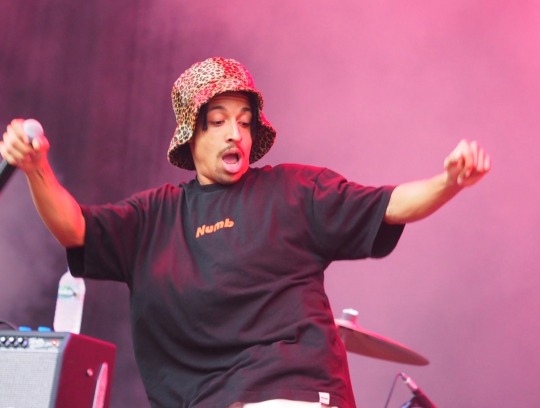
“Thank you for coming to see us in the rain,” Wolfgramm said at the end of the show, glowing with gratitude. These people, she should understand, know how to party.
(Text: Philip Brasor; photos: Mark Thompson)
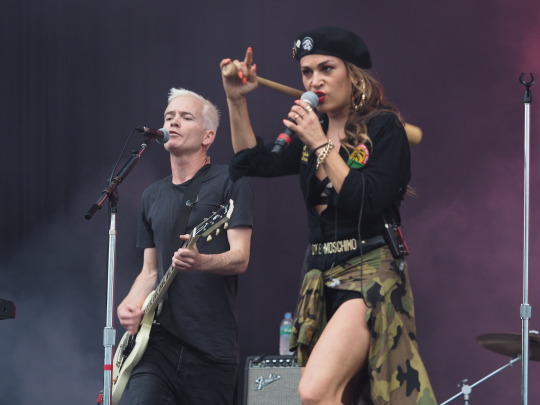
0 notes
Text
Blues are for old people
Probably the oldest group at this year’s festival is The Golden Cups, a band that to most Japanese belongs to that hallowed “group sounds” fad that overran Japanese pop in the 60s in the wake of the Beatles. However, the Golden Cups were slightly outside that manufactured genre. A real bar band influenced by the British blues of the Yardbirds, Cream, and John Mayall, they played the circuit in the 60s, including a lot of American military bases (their name came from the Golden Cup discotheque in Yokosuka, where they often played), where they honed their English along with their chops. Such an education gave them a sort of bad boy cachet that didn’t sit well with the authorities, but nonetheless attracted record companies who were looking for anyone with real ability to play pre-sold compositions. Reportedly, the band hated the bland, predigested pop they were forced to release as A-sides (B-sides were the blues and garage rock they loved).
The men who hobbled out on the Field of Heaven stage in front of a motley bunch of skeptical punters during a steady drizzle didn’t look like the kind of punks the Golden Cups legend sells, and several songs into their set, leader and guitarist Eddie Ban made it clear that they weren’t going to play any of their Group Sounds hits. They stuck mainly to the blues, interspersed with the occasional hard rock original, the kind of song that got them banned in some places in Japan because of the subject matter (usually, loose women). But while they were obviously cruising during the set, their chops remained in tact, and by the end of the 50 minutes, the audience was in their hand, regardless of what they’d come to expect. When they hobbled off the stage at the end, the ovation was sustained and sincere. But they didn’t come back.
0 notes
Text
Burn stuff
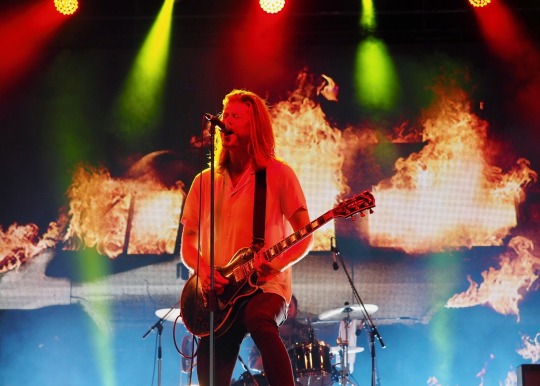
We should probably stop going to the Red Marquee, because as soon as we show up it starts pouring rain outside. Once again, the artist who was playing under these circumstances was rewarded with a capacity audience, as we mentioned yesterday, but in this case they really acted as if they were happy to be there. The young British guitar band the Amazons is the kind of act who are immediately pleasing to the kind of people who come to Fuji Rock: straight ahead hard rock based on juicy riffs and with song titles like “Black Virgin,” and an attitude that likes nothing better than to burn shit up. (The background image was a limo on fire)
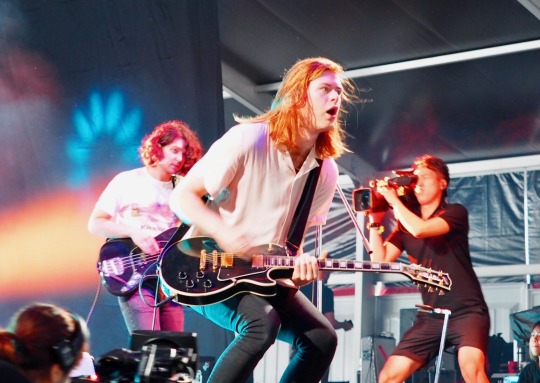
And that’s pretty much what they did for 40 minutes, enough time to go through their impressive debut album and win a truckload of new fans, who were so impressed they kept singing the wordless chorus of the final song even after the band had left the stage. They were so amazed, in fact, they had to come back out and record it, because, naturally, who would believe it back home? Screw the rain.
(Text: Philip Brasor; photos: Mark Thompson)
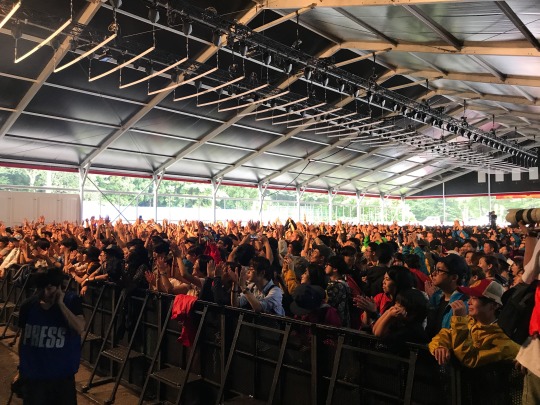
0 notes